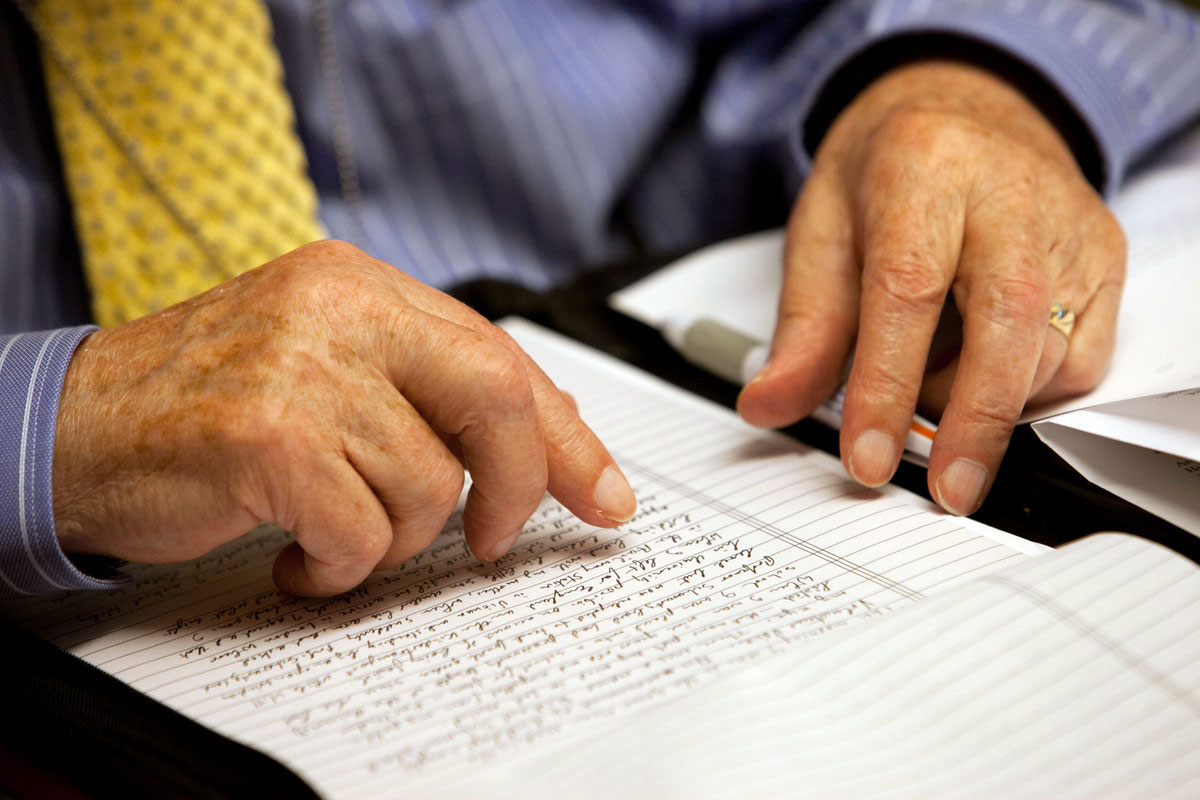Read reflections and testimonies written by Holocaust survivors in their own words.
Blog Home > memory
-
Sorrow Follows Laughter
October 19, 2008
Whenever my children were having a good time, laughing their heads off, not responding even to my warnings to stop, I used to tell them, “You will see that in the end there will be tears!”
-
The Wicker Chair
October 19, 2008
The first three years of my life, which I spent in hiding from 1942 until 1945, seemed very normal to me. Three adults—my mom, my dad, and our friend Selma—as well as my brother were around all the time. They paid attention to me, played with me, and taught me the things you teach a little girl. Of course, I did not realize that our life was only indoors and that going outside to play or for a walk were not part of our daily routine. The adults kept their fears from the children.
-
The Table
October 19, 2008
The old family table now stands in the dining area of our house in Bethesda. The table was made in 1907 when my grandparents got married. It was made of solid mahogany wood in Holland. It was our custom to gather around it for big meals at birthdays, holidays, and any other excuse to be with family and friends. The table was made to seat 24. When it is closed, it seats eight, but you can pull it open and for each board you insert, another set of legs pops out from the bottom.
-
Tata’s Last Word
October 19, 2008
At dawn, the train jerked to a clanging halt. Those close to the bullet holes and cracks in the walls reported what they saw: “Armed German soldiers and Ukrainian guards, people—our people—behind barbed-wire fences, and chimneys. Oh! Borze drogi! Gotinew!” (“Dear God!”) People sighed. Icy fear spread from my chest to every cell in my body. I could not stop trembling. I felt as if it were the world shaking with a ravage force. I clutched my parents, forced myself to sit upright, and tried hard to stay alert. My mind was no longer entirely mine. It was doing things as if in a nightmare. After a short wait and solemn postulations about our future, we heard unbolting bars and rude shouts. “Raus! Raus! Schnell!” (“Out! Out! Move!”) And then they were upon us.
-
Opera in Auschwitz
October 19, 2008
There were arias from La Bohème, Tosca, Madame Butterfly, and many more that I had heard one memorable Sunday afternoon in Auschwitz.
-
The Sonderkarte
October 19, 2008
By the end of 1940, about half of the population from our city of 28,000 Jews, plus the Jews brought in from the neighboring towns, had already been deported. The Dulag (transit camp) was always full to capacity with Jews awaiting deportation either to labor or concentration camps. Jews started thinking of ways that they could be useful to the Germans so they could remain in place.
-
Separation
September 17, 2006
After the night of broken glass, when the Nazis organized and carried out a pogrom of anti-Jewish violence, my parents—like most Jews in Germany—wanted to leave. There was no more waiting to find out if events such as Kristallnacht would cease, or if life would ever be normal again for all of us. Our first choice was to come to the United States, where we had cousins living in New York. They were most anxious to assist us by sending us tickets for the voyage and helping us settle in this new land. However, like most countries, the United States had a quota which had been established many years before and, therefore, we found it impossible to immigrate.
-
Looking for My Father
September 17, 2006
I know my father, Adolf Rosenfeld, was born in 1898 in Korb, Germany. Korb is a very small place. He apprenticed as a baker when he was a young teenager. During World War I he was in the army. During his service in the war he lost a leg. Consequently, when he returned to Korb after the war, he could not work as a baker.
-
Papa’s Magnificent Obsession
September 17, 2006
Next to his family, Papa loved his books best. He collected first editions and rare books. These books were precious to him. Often when dinner conversation centered around our forthcoming emigration from Poland, Papa would state categorically, “The books go with us.” Mama never objected—I think she was just as proud of this collection as Papa was.
-
Hunger Winter
September 17, 2006
It was cold, bitter cold. I was only two and a half years old. My feet itched and hurt and then itched again—the result of chronic cold feet. The attic where my family was hiding had no heating, only a very small camping-like stove that was only used to heat water or some food, if we had it. It was the coldest winter in a long time. The southern part of the Netherlands was already liberated. We were in Amsterdam, the northern part. We were isolated and it was very difficult to get food, oil, or wood to heat. Trees were chopped down clandestinely in the night. Punishment for that action would be fierce.


